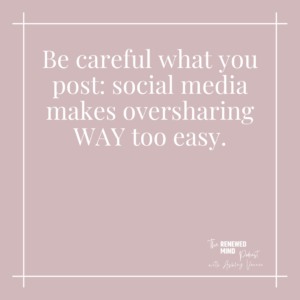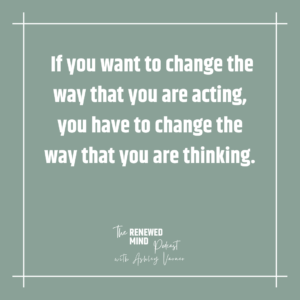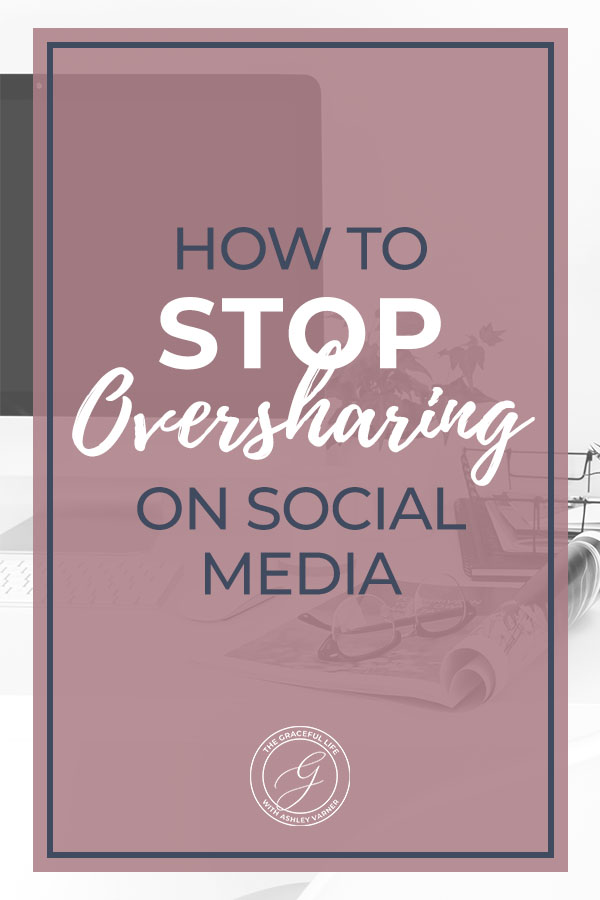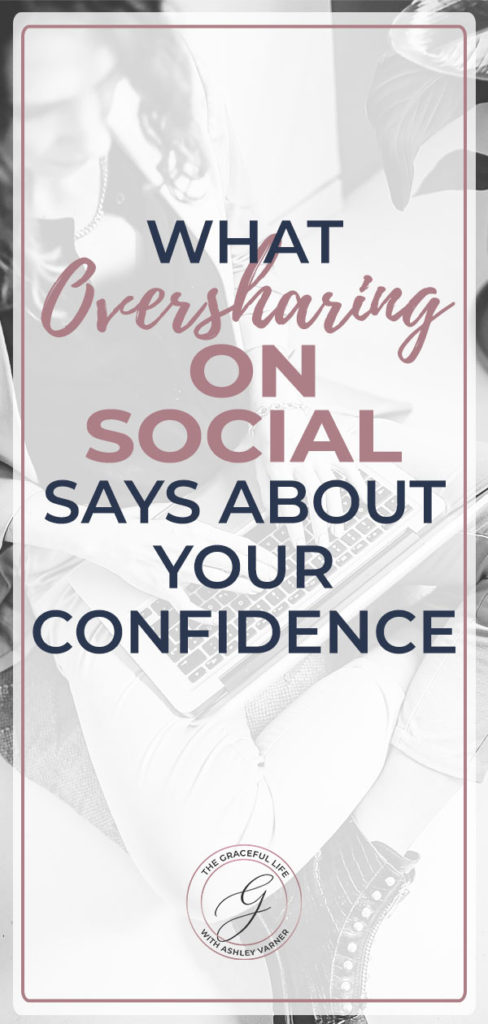Today I’m talking about something I see everywhere: oversharing.
Resources Mentioned
The Mindset Reset
Renew180 (formerly 180Confidence)
Victim Mentality Episode
We all have that one friend who whenever she speaks or posts something on Facebook, we think, “She is sharing way too much information.” If we’re not careful, we can fall into this category ourselves.
Oversharing comes with a lot of problems, and social media has allowed us an unlimited opportunity to overshare. Before the internet, most oversharing happened just between the oversharer and whoever else was within earshot. Now we can overshare with everyone at the same time.
Broadcasting our oversharing on the internet creates a false sense of intimacy. It is also a sign that you are not confident and feel a need for additional validation.
Today we’re going to explore why we overshare, why we shouldn’t, and how we can stop oversharing and start walking in confidence.
Why We Overshare
It’s important to know why you are oversharing. If you want to fix the problem, you have to know the cause. Here are five reasons people overshare:
Loneliness
When talking with clients and other women who are struggling with oversharing, I’ve noticed that many of them have a desire to connect with someone. They feel lonely and want to build a friendship.
The way we feel impacts our actions. If you feel lonely and are thinking about how lonely you are, your mindset is going to influence your actions, but those actions will usually be unhealthy.
If you’re feeling lonely, you probably want to handle it positively (like networking, meeting new people, initiating relationships). However, you might start oversharing instead. You might put everything out there and air your dirty laundry in an effort to help people get to know you.
Insecurity
When people feel insecure, they want validation of who they are and the choices that they have made. They want to prove that they have value. So, sometimes they overshare hoping that people will validate some of what they share and fill their need for affirmation.
I saw this recently in my circle of social media friends. One of my social media friends had made a really large purchase at the same time that her husband made a large purchase. She felt the need to share all the details of their large purchases on Facebook.
Reading between the lines, I could see that she needed her finances to be validated. Her income isn’t where she wants it to be, and she made purchases and shared about them so that other people would validate her financial status.
In my experience, people who know their worth comes from God do not feel a need to put everything they do on social media to get validation.
Social media, unfortunately, encourages oversharing. On that friend’s post, there were a lot of comments saying things such as, “Your husband is so sweet to spend that much money on you!” and other statements about how expensive the purchases were. But that was the goal of the post. She wanted them to validate her purchases.
Anxiety
Anxiety can be experienced when you don’t feel like you fit in, and some people try to make themselves fit in by oversharing. This is similar to loneliness. If you feel apprehensive about your ability to connect with other people, you might share details about your life to create common ground.
But when you overshare to make a connection, that connection isn’t real. It’s forced.
Victim Mentality
A lot of people overshare because they are stuck in the victim mentality.
Recommended Podcast: Victim Mentality
Victim mentality occurs when you want people to be on your side and you (sometimes subconsciously) try to make them feel bad for you or pity you. Victim mentality says that everything is happening to you rather than you having some control over your own actions, mindsets, and emotions.
Sometimes we try to share details all over the internet instead of with one or two people. Instead of having a close friend validate your side of things, you want everyone to be on your side. I’ve seen this a lot with Facebook posts by people who want to share about an argument they are having with their spouse.

This is a problem because it is not Biblical. When we have a problem with someone, we are supposed to go directly to that person. If the situation isn’t resolved, we’re supposed to bring in one person who can help facilitate the reconciliation.
When we overshare, what we are saying is that we are not confident enough in our relationship to deal with conflict the way the Bible tells us to.
I always encourage women to be very careful about what they post on the internet. Think about it before you post, and consider why you want to post it. It’s easy to type something really quickly and post it on the internet, but take the time to pause and think.
Avoiding Real Intimacy
People usually overshare to try to make a connection, but sometimes they are trying to make a connection without having to create real intimacy. When this happens, there is usually an embellishing of details or an overshare occurring with someone you don’t even really like or get along with.
This actually happened to me over the course of the last year. Someone I consider an acquaintance (not a close friend) came to me and shared some very intimate information about her marriage. I was curious about why she shared the information with me. She has much closer friends, and this was very personal stuff.
I realized that she was oversharing with me to avoid real intimacy.
People avoid real intimacy when they don’t have confidence. Confidence is an emotion, and emotions can be changed by our thoughts.
The Problem with Oversharing
Oversharing isn’t harmless. There are serious problems that arise from sharing too much.
Regret
Oversharing can happen subconsciously. Once it is a habit, you can overshare without even realizing it. Oftentimes, we don’t realize we are oversharing until we are in the middle of spilling information or after the fact. You might be filled with regret or wish you could reel back all of those details. That’s why it is important to be aware of your thoughts.
Nothing is Solved By Oversharing
The truth is, oversharing never solves a problem. So, when we are oversharing because we want to connect with people or because we are anxious, we are still left without connections and full of anxiety after the information has been shared.
How to Stop Oversharing
Now that we know why we overshare and why we shouldn’t, let’s look at some practical steps we can take to stop oversharing.
Recognize the Real Reason for the Oversharing
The action of oversharing comes from an emotion that comes from your thoughts. When I coach women who struggle with oversharing, I encourage them to examine the emotion that is driving the action.
I want you to dig deep and find the emotion that is driving your oversharing. Once you’ve found the emotion, try to find the thought that is behind it.

This is a type of thought work that I use with the women in The Mindset Reset. This is where the rubber meets the road. If you want to change the way that you are acting, you have to change the way you are thinking and feeling. Sometimes, it takes someone who is outside the realm of your life to help you figure out what to do until you get the skills to handle it yourself.
Journal Before You Share
Before you post an overshare on social media, sit down and write it out in your journal. Examine why you want to share what you wrote.
There is nothing wrong with posting on social media. It’s not even wrong to purchase something and share about it on social media. What matters is the reason behind it.
I want you to like your reason.
If the reason is that you are lonely or need validation, you probably won’t like that reason. If your reason is that you want to encourage someone or publicly thank your husband for the nice thing he bought you, that’s different. If you like your reason, go ahead and share.
Be Aware of Your Audience
Think about who is hearing/reading what you are sharing. You don’t want to share with just anyone. Remember when I said an acquaintance overshared personal information with me? It wouldn’t have mattered as much if she was sharing with someone who is her close friend and knows her well enough to give good advice.
Pay attention to the scope of your audience, too. When you post on Facebook, all of your Facebook friends can see that. If your Instagram is public, anyone can see it. If you’re sharing something that would be best to tell your close friends about, then only share it with them.
Create Healthy Sharing Boundaries
I love the idea of rules. People who know me personally know that I love following rules. I use that as a benefit in my life by creating rules that help me reach goals. For example, if I want to spend less on Amazon, I might make a rule such as only making purchases every other week or keeping something in my cart for a certain length of time before I can purchase.
If your goal is to stop oversharing, create a boundary around what you share. For example, you could make a rule for yourself that says you have to send a screenshot of what you want to share on Facebook before you post and send it to a trusted friend who can help you determine if you are oversharing or not.
Another healthy boundary might be defining what areas/events in your life you do not want to share details about. One area might be your marriage. Once you create that boundary, you know that you cannot share anything on social media about your marriage.
You could also have one specific and trusted friend who you talk to about your family problems. That way you have someone to talk to without sharing with everyone.
These boundaries might be temporary while you’re learning not to overshare, or you could create permanent boundaries for things that are important to you.
Reevaluate All Social Media Sharing
People who are posting everything, are usually hiding the real truth.
If you always have to post about how wonderful your husband is, maybe you actually aren’t convinced that he is a good husband. Please don’t take this personally because it isn’t true for everyone. I’ve just personally seen women posting very embellished posts about their marriages and then filing for divorce a month later.
One of the biggest examples of this is the Dave and Rachel Hollis divorce where they were having conferences on how to have a great marriage and blowing up social media with posts about how amazing their relationship was yet announced a couple of months later that they were getting a divorce.
Overshare can be an attempt to cover up a lack in your life. Evaluate what you are sharing.
Oversharing is Not the Same as Authenticity
The volume of information you share doesn’t equal the level of genuineness.
Sometimes we think they are connected. We think that the more we share, the more authentic or transparent we are being. We need to shift our mindsets to knowing that we can be authentic on social media without oversharing specific details.
I have a friend that believes in being super transparent on social media. To be honest, I don’t value that when it comes to social media. I’m not saying you should lie, but you don’t have to be transparent and open with every single person who follows you on social media.
I am honest on social media, but I don’t share every detail.
An example of this is an influencer who is covered in tattoos. She shares a lot about her marriage and her home life, but she doesn’t share anything about her tattoos. When her followers ask, she tells them that her tattoos are personal and she is going to keep that information to herself. Does that mean she isn’t transparent and genuine? No. She just has certain areas of her life that aren’t for everyone else.
Conclusion
I hope that after reading this you are able to go about your day and be intentional about what you want to share. I don’t want you to stop sharing. I want you to share with people who value you and have a connection with you. Instead of sharing with everyone, create deeper connections with close friends.
If this spoke to you, leave a comment below, and don’t forget to follow me on social media or subscribe to my YouTube channel to stay up-to-date.
Share or Pin for Later

